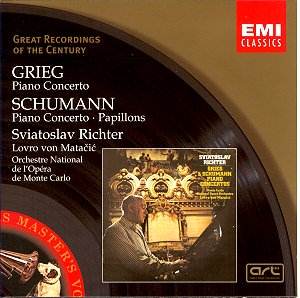So many of Richterís most incomparable performances
reach us via fortuitous live recordings, and yet when the great
man was persuaded into the studios with proper equipment and engineers
at the ready, as like as not he would freeze. Common repute has
it that something of the kind happened with this Grieg/Schumann
coupling, which was accorded only modest rapture on its first
release and enjoyed a shortish catalogue life. Bryce Morrisonís
notes, inspired to full poetic fancy by the live performance of
"Papillons", seem to want to put us on our guard ("Richter
is heard in more sombre, unsmiling mood"). Oddly enough,
thatís not how I hear it.
Itís true that Richter is massive rather than
dashing in the opening flourish of the Grieg and in similar passages
elsewhere, but if you play them in tempo thatís how they come
out. The fastish finale, on the other hand, has all the dash you
could wish, albeit of a very purposeful
kind. Itís also true that von Matačić, a rather more
impulsive and free-wheeling type of artist when left to his own
devices, sometimes seems to want to give things a spurt onwards
in his louder tuttis and applies only a rather generalised
romanticism to the lyrical melodies. But itís also true, at least
to my ears, that Richter invests the romantic melodies with genuine
warmth, a mellow tone and a flexible rubato even while maintaining
an essentially classical approach (the second subject of the first
movement is not slowed down any more than Grieg actually asks
for).
All this amounts to a Grieg Concerto performance
among the élite, yet the Schumann is finer still. Once
again, Richter is colossal rather than dashing in the opening
flourish, and with all the more reason since in this case it is
not a mere romantic gesture but part of the argument. Thereafter
Richter unfolds the first movement with much quiet mastery, warmth
of tone and, yes, real tenderness and affection. The Intermezzo,
as in the case of the Kempff/Krips reissue I enthused over recently,
is slowish, and again warm and intimate in feeling. The Finale
has strength but also sparkle, and the syncopated second subject
is played straight, not pulled about as often happens.
In this work, too, I have only praise for von Matačićís
contribution.
The recordings are generally satisfactory, reminding
us only in the more strenuous moments that even to this day the
pianists who record best in fortissimo are those whose
tone seems under-projected in the concert hall; there seems also
to be some such extraneous noise as a thumping pedal, and headphone
listening reveals a few clicks and creaks (from the podium? Chairs?
Music stands?). I wouldnít let that put me off. When I first saw
this I had my doubts that EMI were exploiting the name of Richter
to insert a second-stream product into their "Great Recordings
of the Century" series. On the contrary, I feel that this
CD deserves belated recognition among the "classic"
Grieg/Schumann couplings, headed by Lipatti and Solomon.
And then you get "Papillons". In the
wake of the arrival in the west of the "Richter phenomenon",
EMI engineers followed him round on his first tour of Italy. Various
vicissitudes had to be overcome, and recording live was considered
a rather anomalous proceeding in those days. The result was that
the recordings were held over, on the grounds that they were not
on a level with the best EMI studio recordings, and eventually
released on the World Record Club. In view of what we are often
prepared to endure in the sacred name of Sviatoslav Richter thereís
not much to complain about. The CD transfer is just slightly plummy
compared with the original LP (the result of an unwise attempt
to mellow it down?) but I was held spellbound as always by the
sheer range Richter finds in these innocent-looking pieces. Again,
he is massive in fortissimo, but also tender, affectionate,
mercurial; in short, fantastic in the most literal sense
of the word. The final fade-away as the clock strikes is the stuff
legends are made of.
Christopher Howell
see also review by Kevin
Sutton
Great Recordings
of the Century
